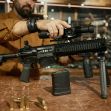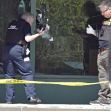In a victory for the victims of a 2019 mass shooting at a synagogue in California, Judge Kenneth Medel of the Superior Court of California for San Diego County ruled that the victims of the shooting can move forward with a lawsuit against gun manufacturer Smith & Wesson after the company’s product was used in the shooting.
The 2019 shooting occurred in late April after a gunman fired inside the Chabad of Poway Synagogue. The alleged gunman, 19-year-old John Earnest, killed 60-year-old Lori Gilbert-Kaye and injured three others. The synagogue's rabbi and an eight-year-old were among those injured. Following the shooting, Earnest fled only to call 911 and report the shooting.
After the shooting, it was revealed that Earnest used an M&P 15 semiautomatic rifle manufactured by Smith & Wesson which mimicked the controversial AR 15.
A lawsuit filed by the victims and survivors of the shooting was given the green light after Judge Medel denied Smith & Wesson's claim that they were protected against the lawsuit because of the Protection of Lawful Commerce in Arms Act (PLCAA). This federal law gives gun manufacturers along with businesses that sell guns protection from liability in the event a shooter uses a gun made by the manufacturer or sold by an individual business. In the lawsuit, both Smith & Wesson and San Diego Guns, the business in which Earnest purchased the rifle, were named as defendants.
In the ruling, Judge Medel explained that while the PLCAA does protect manufacturers and businesses against lawsuits when guns are used in mass shootings, the federal law cannot be applied when gun businesses and manufacturers violate state laws.
Medel ruled that because San Diego Guns sold Earnest the firearm, they violated the state's law that requires individuals to meet the 21-year-old age minimum when purchasing a long gun like the M&P 15.
The lawsuit, which was filed in 2020, argues that Smith & Wesson knowingly used deceptive practices when advertising the rifle. In the complaint, they argued that Smith and Wesson's advertisement practices were a violation of California’s unfair competition law because it “attracted impulsive young men with military complexes who were particularly likely to be attracted to the unique ability of AR-15 style weapons." They explained that Smith & Wesson used tactics including marketing the rifle on social media and advertising it in a method akin to methods used to market a video game. They also add that the name of the gun was deceptive to the general public as well. The “M” and “P” in the M&P 15 stood for “military and police,” yet a majority of the guns were sold to gun enthusiasts and civilians.
The lawsuit is seeking unspecified damages as well as an injunction which would require Smith & Wesson to stop the misleading marketing and advertising practices that they claim encourage misuse use of the weapons.
Jon Lowy, the chief counsel for the Brady Campaign to Prevent Gun Violence, is representing the victims and survivors of the shooting. Lowy said of the judge's ruling, "Today's judgment is a victory, and an important step on the road to justice for the victims of the shooting at Chabad of Poway Synagogue, and all Americans who believe that the gun industry is not above the law. We look forward to proving our case in court, and working to prevent future tragedies."
This ruling is the latest in favor of victims of mass shootings. In March 2019, the Connecticut Supreme Court ruled that popular gun maker Remington could also be challenged in lawsuits after its misleading marketing over the Bushmaster rifle which was used in the devastating Sandy Hook school shooting that took the life of six teachers and 20 students.
Earnest was set to have his trial take place in June 2020, but because of the pandemic, his case was pushed over a year forward. Earnest is facing hate crime charges as well as state murder charges that carry a possible death sentence.






